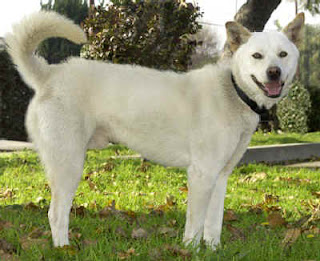 The Jindo dog was named after Jindo Island in Southwest Korea and was only available on the island. Under Korean national law, the Jindo dog is protected as the 53rd Natural Monument. Although relatively unknown outside Korea, it is celebrated in its native land for its unwavering loyalty to its master. It is generally unknown breed outside of Korea, especially purebreds, since the Korean government restricts the exportation of this breed but Korean-Americans have been bringing Jindos to America since the mid-1980's.
The Jindo dog was named after Jindo Island in Southwest Korea and was only available on the island. Under Korean national law, the Jindo dog is protected as the 53rd Natural Monument. Although relatively unknown outside Korea, it is celebrated in its native land for its unwavering loyalty to its master. It is generally unknown breed outside of Korea, especially purebreds, since the Korean government restricts the exportation of this breed but Korean-Americans have been bringing Jindos to America since the mid-1980's.
Jindo dogs are known to be extremely loyal and affectionate toward its master, a clean animal both in its body as well as its habits, very independent, highly intelligent, proud and trainable only by the master. Jindo dogs will housetrain themselves as puppies. Even off lead or without direction, they will often relieve themselves in the farthest corner of the yard. They are also renowned for their almost uncanny homing instinct. It has an innate sense of direction and is capable of returning home from several hundred miles away.
The Jindo is a medium-sized, double-coated spitz-type dog, with prick ears. The body is either square or slightly longer than tall. Jindo are divided into two body types the Tonggol or Gyupgae and Hudu or Heutgae. The first one is very muscular and shorter in body, with a depth of chest equal to one-half the height at the withers and a shorter loin, while the other one is more slender with somewhat less depth of chest and a slightly longer loin. Typically, the males are larger with heavier heads and females have more fox-like features. These two types are gradually being blended into a third type called Gakgol, which retains the length of body of the Hudu style and the depth of chest of the Tonggol style.
The Jindo breed is also a great hunting companion; they are often brought along when hunting deer, wild boar, rabbit, raccoon, and badger. Due to Jindo’s courage, cunning, and pack sensibility they are renowned as great hunters.
skip to main |
skip to sidebar
interested in exchanging links?
email me at
xpalaboyx at gmail.com
 This
work is licensed under a
Creative Commons Attribution 3.0 United States License.
This
work is licensed under a
Creative Commons Attribution 3.0 United States License.
template by www.blogcrowds.com
Pet Planet talks everything about pets plus several pet information articles and pet product reviews.
Pages
Categories
- Pet tips (27)
- pet news (27)
- Pet health (24)
- Pet info (18)
- animal pictures (18)
- pet videos (15)
- funny cats video (13)
- dog videos (12)
- rescued pets (12)
- pet jokes (10)
- dog breed (9)
- Pet product review (7)
- cat pictures (7)
- funny pets video (4)
- pet supply (4)
- Pet celebrity (3)
- dog health (3)
- funny dogs video (3)
- pet adoption (3)
- grumpy cat (2)
- recognition (2)
- Dog Costumes (1)
- Increased exercise with pet ownership (1)
- Pet ownership benefits (1)
- Physical health benefits of pet ownership (1)
- Polls (1)
- animal video (1)
- cat breed (1)
- dog pictures (1)
- dog toys (1)
- penguin (1)
Blog Archive
Links
email me at
xpalaboyx at gmail.com
Other Blogs
Followers
 This
work is licensed under a
Creative Commons Attribution 3.0 United States License.
This
work is licensed under a
Creative Commons Attribution 3.0 United States License.
template by www.blogcrowds.com
Cookies help us deliver our services. By using our services, you agree to our use of cookies.


